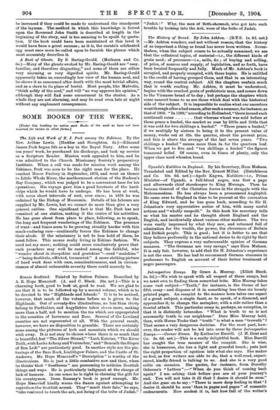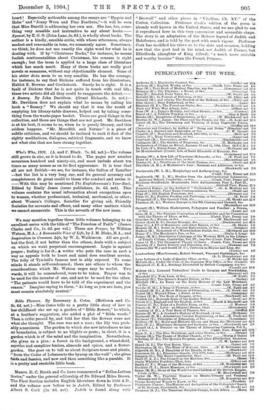Introspective Essays. By Grace A., Murray. (Elliot Stock. 3s. 6d.)—We
wish to speak with all respect of these essays, but we must own to finding them somewhat trite. Miss Murray takes some vast subject—" Truth," for instance, is the theme of her fifth essay—and disposes of it in something less than six loosely printed pages. An essayist to the manner born takes one aspect of a great subject, a single facet, so to speak, of a diamond, and approaches it, to change the metaphor, with a side rather than a frontal attack. This particular essay is, perhaps, an exception, in that it is distinctly heterodox. "What is truth to us is not necessarily truth to our neighbour." Does Miss Murray hold, then, with Horne Tooke that "truth" is what a man "troweth" ? That seems a very dangerous doctrine. For the most part, how- ever, the reader will not be led into error by these Introspective Essays.—Co2iter Stones. By Katharine Buraill. (J. M. Dent and Co. 3s. 6c1.• net.)—This is a really delightful book. Miss Burrill has caught the true manner of the essayist. She is wise, she is humorous, she has a light and graceful touch; puts just the right proportion of egotism into what she says. She makes us feel; as few writers are able to do, that a well-read, experi- enced, kindly friend is talking to us. And she is a very good critic on occasion. She quotes, for instance, from Dorothy Osborne's " Letters ":—" When do you think of coming back again? I am asking that before you are at your journey's end. You will nob take it ill that I desire it should be soon." And she goes on to say " There is more deep feeling in that desireoit should be soon' than in pages and pages" of romantic endearments. How modest it is, but how full of the writer'a heart ! Especially noticeable among the essays are "Hygeia and 'Eche" and "Jenny Wren and Pine Feathers,"—it will be seen that Miss Burrill is addressing her own sex. She has, toe, some- thing very sensible and instructive to say about books.- Egemet, by E.G. O. (John Lane, 3s. 6d.), is wholly about books. The -author is a kindly, sensible critic), with whose utterances, always modest and reasonable in tone, we commonly agree. Sometimes, we think, he does not use exactly the right word for what he is dealing with. If by "Christmas Books," for instance, he means foolish sentimentalities about Christmas, his censure is right enough ; but the term is applied to a large class of literature which has much merit. Many of these books are really 'good novels or romances, without any objectionable element. Some of his obiter dicta seem to us very sensible. He has the courage, for instance, to say that Dickens suffered from his illustrators, Hablot K. Browne and Cruikshank. Surely he is right. It is a fault of Dickens that he is not quite in touch with real life ; these two artists did all they could to exaggerate the defect.- A Rosary. By John Davidson. (Grant Richards. 5s. net.)- Mr. Davidson does not explain what he means .by calling his book a "Rosary." We should say that it was the result of -emptying his library-table drawers, helped out by taking some- thing from the waste-paper basket. There are good things in the -collection, and there are things that are not good. Mr. Davidson is at his best, it seems to us, when he is purely literary, and this seldom happens. "Mr. Meredith and Nature"' is a piece of subtle criticism, and we should be inclined to rank it first of' the -eighty meditations, dialogues, satirical fragments, and we know not what else that are here strung together.







































































 Previous page
Previous page